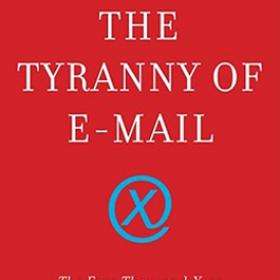The Tyranny of Email By John Freeman

4/5
Do you find yourself checking your email multiple times an hour? When you wake up? When you got to bed? Have you ever watched a relationship suffer simply because one email was not responded to? Then John Freeman’s new indispensable book, The Tyranny of E-mail, is the fascinating must-read of the moment for you. More than an attack on the simple fact that in 2007 thirty-five trillion emails were sent worldwide, Freeman is really aiming his venom at the greedy corporations out there that have perfected the art of using it to enslave their employees even more than they already were.
Being human, he has turned out a book that has a few flaws, the most obvious ones being that it is overly reliant on invoking the children when listing what is evil about the Internet and it circles back and hits on multiple points multiple times. Also, in an attempt to set his argument within the proper context Freeman has provided a long, laborious history of communication that weights down the reading experience. In an ideal world he would have made his point in a long essay and not a 220 page book. But the padding and the stretching aside this book remains one of those rare finds that has the ability to change the way you view the world.
One of Freeman’s strongest points is that constantly checking your email creates the same emotional response in humans as playing a slot machine. But instead of hoping to hit a financial jackpot we are continuously refreshing our boxes in hopes of finding something that will satiate the need; some gossip, an invite out, or, better yet, a proposition. And, as Freeman points out, the best way to increase your odds is to push the send button as much as possible. But take a look through your email box, chances are that it is filled with spam, useless interactions with friends, and a whole bunch of crap from work. And it is that crap from work that really has Freeman riled up and it allows him to move into his most insightful point – that corporate America, forever obsessed with getting more work out of their employees, has sold them the idea that email liberates them from the office while simultaneously creating an environment in which we are all on call 24/7.
Paranoids really need not worry about Freeman trying to grab your Blackberry. All he is arguing for is a mere re-evaluation of where we stand in relation to this technology. Yes, there is a lot to love about email but it also has a dark and nefarious side to it. One of his suggestions is that you only check your email twice a day, now as scary as that may be isn’t it a small price to pay to ensure that your attention span isn’t ground into dust by the technological revolution? His tone is extremely alarmist and often that works against his points, but tone is also something that can be ignored. He also seems nostalgic for a bygone golden era of letter writing that either never existed or went extinct for a good reason. But as you agree with him, and then don’t, and then agree with him again, one thing that remains constant is the way the book is always able to engage and keep readers on their toes while discussing the most relevant of all topics.
Now, if you happen to be one of those chronic email checkers, the type that The Tyranny of E-mail is taking aim at, then there is a possibility that reading this will only drive you deeper into your addiction. However after finishing the book we should all agree that our obsession with email and all her many flirtatious cousins (texting, facebooking, tweeting) is out of control. The problem is that given the choice we would also agree to do nothing about it because that is just how hooked we are. As the book draws to a close Freeman becomes philosophical and begins to pontificate on how perhaps this is all an attempt to repress our fear of death. After all, if we are spending all our time reading and responding then that leaves none to contemplate our own mortality. At first it seems like a stretch but the more you think about it the more profound it becomes, and this book is nothing if not profound. Read it and expand your mind.
Author: John Freeman
Pages:256
Publisher: Scribner
RELATED ARTICLES
Get the most-revealing celebrity conversations with the uInterview podcast!







Leave a comment